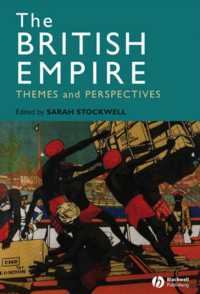Full Description
The Routledge Handbook of Chicana/o Studies is a unique interdisciplinary resource for students, libraries, and researchers interested in the largest and most rapidly growing racial-ethnic community in the United States and elsewhere which can either be identified as Chicano, Latino, Hispanic, or Mexican-American. Structured around seven comprehensive themes, the volume is for students of American studies, the Social Sciences, and the Humanities. The volume is organized around seven critical domains in Chicana/o Studies:
Chicana/o History and Social Movements
Borderlands, Global Migrations, Employment, and Citizenship
Cultural Production in Global and Local Settings
Chicana/o Identities
Schooling, Language, and Literacy
Violence, Resistance, and Empowerment
International Perspectives
The Handbook will stress the importance of the historical origins of the Chicana/o Studies field. Starting from myth of origins, Aztlán, alleged cradle of the Chicana/o people lately substantiated by the findings of archaeology and anthropology, over Spanish/Indigenous relations until the present time. Essays will explore cultural and linguistic hybridism and showcase artistic practices (visual arts, music, and dance) through popular (folklore) or high culture achievements (museums, installations) highlighting the growth of a critical perspective grounded on key theoretical formulations including borderlands theories, intersectionalities, critical race theory, and cultural analysis.
Contents
Introduction: Handbook of Chicana/o Studies, Francisco A. Lomelí, Denise A. Segura and Elyette Benjamin-Labarthe
Part I. Chicana/o History and Social Movements
Introduction to Chicana/o History and Social Movements
1. What is Aztlán?: Homeland, Quest, Female Place, David Carrasco
2. Chicano History- A General Approach, Mario T. García
3. Recent Chicana/o Historiography: Advances, Shortcoming, and Challenges, Alex M. Saragoza
4. The Chicano Movement, Ramón A. Gutiérrez
5. A Genealogy of Chicana History, the Chicana Movement, and Chicana Studies, Miroslava Chávez-García
6. Bilingual Education: History, Policy, and Insights from Critical Race Theory, Grace P. McField
Part II. Borderlands: Contested (Im)migrations, Culture and Citizenship
Introduction to Borderlands: Contested (Im)migrations, Culture and Citizenship
7. México y lo Mexicano in Aztlán: Transborder Economic, Cultural and Political Links, David R. Maciel and María Rosa García-Acevedo
8. Immigration, Latinos, and the Media, Leo R. Chávez
9. Mobilizing for Life: Illegality, Organ Transplants, and Migrant Biosociality, Jonathan Xavier Inda
10. Discourses of Violence and Peace: About and On the U.S.-Mexico Border, María-Socorro Tabuenca
11. Reconstructing Home in the Borderlands, Patricia Zavella
Part III. Cultural Production in Local and Global Settings
Introduction to Cultural Production in Local and Global Settings
12. Colonial, De-colonial, and Transnational Choreographies in Ritual Danzas and Popular Bailes of Greater Mexico, Enrique R. Lamadrid
13. The Challenge of Chicana/o Music, Steven Loza
14. Chicana/o Literature's Multi-Spatiotemporal Projections & Impacts; or Back to the Future, Frederick Luis Aldama
15. From Don Juan to Dolores Huerta: Foundational Chicana/o Films, Catherine Leen
16. Origins and Evolution of Homies as Hip Rasquache Cultural Artifacts: Taking the Homies Out of the Barrio or the Barrio Out of the Homies, Francisco A. Lomelí
Part IV. Indigeneity, Mestizaje, Postnationalism, and Transnationalism: Overarching Phenomena of Interdisciplinarity
Introduction to Indigeneity, Mestizaje, Postnationalism, and Transnationalism: Overarching Phenomena of Interdisciplinarity
17. The Embodied Epistemology of Chicano Mestizaje, Rafael Pérez-Torres
18. New Tribalism and Chicana/o Indigeneity in the Work of Gloria Anzaldúa, Domino Renee Pérez
19. "Aztlán es una fábula": Navigating Postnational Spaces in Chicana/o Culture, Marc Priewe
20. Regional Singularity and Decolonial Chicana/o Studies, Lene M. Johannessen
21. Transnationalism Chicana/o Style, Karin Ikas
Part V. Chicana/o Identities and Political Expressions
Introduction to Chicana/o Identities and Political Expressions
22. Narrative Identity and the Dialectics of Selfhood in Chicana/o Writing, Sophia Emmanouilidou
23. The Challenge of Colorism in the Chicana/o Community, Margaret Hunter
24. Bilingualism and Biculturalism: Spanish, English, Spanglish?, Cecilia Montes-Alcalá
25. The Landscapes and Languaging of Chicana Feminisms, Aída Hurtado
26. The Aesthetics of Healing and Love: An Epistemic Geneaology of Jota/o Aesthetic Traditions, William A. Calvo-Quirós
Part VI. Violence, Resistance and Empowerment
Introduction to Violence, Resistance and Empowerment
27. The Art of Disruption: Chicana/o Art's Politicized Strategies for Aesthetic Innovation, Guisela Latorre
28. Resisting the Dominant Anglo-American Discourse: Political Activism and the Art of Protest, Astrid M. Fellner and Claire M. Massey
29. Spanish Language Media: From Politics of Resistance to Politics of Pan-ethnicity, Xavier Medina Vidal and Federico Subervi-Vélez
30. Transnational Incest: Sexual Violence and Migration in Mexican Families, Gloria González-López
Part VII. International Perspectives on Chicana/o Studies: From Aztlán to Shores Abroad
Introduction to International Perspectives on Chicana/o Studies: From Aztlán to Shores Abroad
31. Chicana/o Studies in France: Emergence and Development, Elyette Benjamin-Labarthe
32. Chicano Studies and Inter-American Studies in Germany, Gabriele Pisarz-Ramírez
33. Reception of Chicano Literature and Culture in Italy: A Survey, Erminio Corti
34. A Trans-Atlantic Look at Chicano Culture and Literature from a Spanish Perspective, José Antonio Gurpegui








